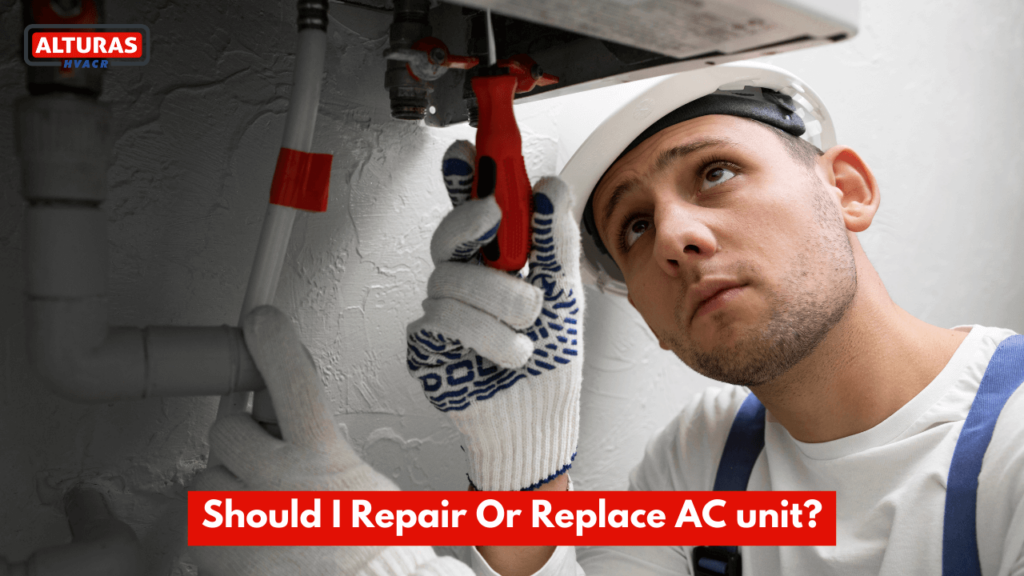It’s not easy to know if you should repair or replace AC unit. Fixing your current AC is cheaper. But it will only work for a few more months or years. A new AC will cost more upfront. But it will save money on energy bills each month. And you won’t need to worry about it breaking down soon.
There are a few things to think about. How old is your current AC? Is it in bad shape? Have you had to fix it a lot lately? A new AC could save a lot on energy costs. Weigh all the pros and cons. Then decide if fixing or replacing makes more sense for your budget.
Repair or Replace Your Air Conditioner?
Air conditioners can stop working well for many reasons. You have two choices. You can fix the AC unit you have now. Or you can buy a new air conditioner. Which option is best? Whether to repair or replace your AC unit depends largely on its age and the cost of the repair: If your AC is older than 10 years and the repair cost is significant, replacing it with a newer, more energy-efficient model is usually the better option as it can save you money on energy bills in the long run; however, if your AC is relatively new and the repair is minor, fixing it is generally preferable.
When to repair:
Minor issues like a clogged filter or faulty thermostat, Relatively new AC unit, and Simple and inexpensive repairs.
When to replace:
AC is more than 10 years old, Major component failure (like compressor), High repair cost compared to a new unit, and Frequent repair needs.
Signs Your Air Conditioner Needs Repair
Sometimes, a simple fix can breathe new life into your AC. Here are some signs that AC repair might be the answer:
- Reduced Cooling Performance: Is your AC struggling to keep your home cool, even when set to a low temperature? This could indicate a refrigerant leak, clogged air filters, or a malfunctioning thermostat.
- Unusual Noises: Grinding, clanging, or screeching noises emanating from your AC unit are red flags. These noises could point to loose components, worn bearings, or a failing compressor.
- Leaking Water: Puddles around your indoor unit or excessive condensation on the outdoor unit signify a drainage issue. Left unattended, water leaks can damage your AC unit and surrounding areas.
- Short Cycling: Is your air conditioner turning on and off quickly? This action is called short cycling. It might happen because the condenser coil is dirty. A faulty sensor or low refrigerant level could also cause this.
- Increased Energy Bills: Are your energy bills higher than usual without any clear reason? If your AC unit is not working well, it may use more energy. Getting it repaired could help it run better and lower your bills.
Benefits of Repairing My Air Conditioner:
- Cost-Effective: Fixing your air conditioner is usually cheaper than buying a brand new one. This can save you a lot of money if the repair cost is a big worry.
- Quick Fix: An HVAC company can often repair your AC unit in just one day, depending on the issue. This means your home will be cool and comfortable again very soon.
- Environmentally Friendly: Repairing your existing air conditioner helps it last longer. This reduces electronic waste. It also decreases the environmental impact of making a new unit.
In-Depth Guide: Common Air Conditioner Problems and Solutions
Signs Your Air Conditioner Needs Replacement
Your air conditioning system works well with repairs, but at times, you need a replacement. Understanding when to repair or replace your HVAC system can save on energy costs and improve efficiency. Here are key signs that indicate it’s time to upgrade your cooling system:
Get AC Installation Los Angeles Services
- Your Unit’s Age: Air conditioning systems typically last 10-15 years. If your unit is nearing the end of its lifespan, upgrading to an HVAC system with improved SEER ratings can enhance efficiency and lower long-term costs.
- Frequent Fix-ups: If your HVAC professional has to fix your air conditioning unit frequently, the repair cost may outweigh the benefits of keeping the system. Investing in new HVAC equipment can lead to better energy savings.
- Extensive Damage: It might be better to replace your air conditioner if it has major problems. For example, a broken compressor or cracked refrigerant line. Replacing it could save you money in the long run.
- Inefficiency: Older air conditioners usually use more energy than newer ones. Getting a new, more efficient model can lower your energy bills over time. You’ll save money on cooling costs.
- Limited Cooling Capacity: Does your AC struggle to keep your home cool, even on mild days? This could mean it’s too small or old. Replacing it with a properly sized, efficient unit can make your home much more comfortable.
- Rising Energy Bills – Older air conditioning systems tend to lose efficiency over time, leading to higher energy bills. A system with a higher Seasonal Energy Efficiency Ratio (SEER) rating will provide better performance and lower your energy costs.
- Strange Noises or Odors – Loud noises, unpleasant smells, or excessive humidity are signs of HVAC equipment failure. An HVAC professional can assess whether a repair is enough or if replacing your air conditioner is the best option.
Also Read: Best and Worst Air Conditioner Brands
Benefits of Replacing My Air Conditioner:
- Improved Efficiency: New air conditioners use less energy than old ones. This saves money on bills. It also helps the environment.
- Enhanced Comfort: Modern ACs can cool rooms better. They adjust speeds to maintain comfortable temperatures. Cooling happens in stages for even cooling.
- Increased Reliability: A new AC comes with a warranty from the company. This gives peace of mind. The warranty protects against unexpected problems.
- Improved Air Quality: Some new ACs have better air filters. These filters remove dust, pollen, and other particles. This makes indoor air cleaner and healthier.
Dig Deeper: Air Conditioner Maintenance Checklist
When to Call a Professional
Diagnosing and repairing AC units can be complex tasks. Unless you’re a qualified HVAC technician, it’s best to leave AC repair or replacement decisions to a professional. Here are some situations where calling a qualified HVAC technician is essential:
- Safety Concerns: It’s risky to handle a refrigerant leak yourself. Breathing in refrigerant can harm your lungs or even lead to death. It’s best to leave this issue to experts.
- Electrical Issues: Problems with the electrical parts of your AC could start a fire. Don’t try to fix electrical problems on your own. That’s too dangerous.
- Complex Repairs: Some AC repairs need special tools and skills. Replacing parts like the compressor or fixing refrigerant lines is complex work. Let qualified technicians handle these tasks.
- Diagnosis Uncertainty: If you don’t know what’s wrong with your AC, an expert can properly identify the issue. They’ll recommend whether to repair or replace the unit based on their diagnosis.
Conclusion:
Deciding whether to repair or replace your air conditioner is important. This guide helps you make the best choice for saving money and energy. Look at the factors. A professional can give good advice for your situation too.
With regular care, your AC unit will keep your home cool in summer. If you think something is wrong, have it checked. A working AC means a comfy home!
FAQs
How Long Do Air Conditioners (And Parts) Last?
Air conditioners usually work for 10 to 15 years. However, some can run longer if you take good care of them. You should service them regularly. The way you use them and how well they were installed also matters.
How Much Does a New HVAC System Cost?
Getting a new heating and cooling system can cost a good bit of money. The price depends on a few things. It depends on how big your home is. It depends on how well the system works. The brand also matters. And you need to pay for the cost of installing the system too. On average, most homeowners pay between $5,000 and $10,000 for a new heating and air conditioning system. But the total cost can sometimes be even more.
How Much Is a New AC?
Getting a new air conditioner can cost a fair amount of money. Many things affect the price. The brand is one thing. The size also matters. The energy rating plays a role too. Don’t forget the installation costs. On average, a new central AC unit for the home can run from $3,000 to $7,000. It depends on the specific unit and installation needs.
Also read: Common Problems With Oversized Air Conditioner
Is It Better to Repair or Replace an AC?
Air conditioning units sometimes need fixing. You need to think about a few things when deciding to repair or replace. First, check how old the unit is. Next, see how bad the damage is. Then, compare the repair cost to a new unit’s price. As a rule, replace the unit if repairs cost over half of a new one. That is often the better choice money-wise.
Is It Worth Fixing a 20-Year-Old AC Unit?
The AC unit is very old, it has been working for 20 years. Small repairs can keep it running. But older units use more energy and break down often. Getting a new AC unit may save money in the long run. New AC units work better and use less energy.
When Should You Replace or Repair Your Air Con?
It may be time to get a new air conditioner. Or fix your old one. Air conditioners start acting weird when they get old or worn out. They may stop working a lot. Or waste energy. Sometimes fixing an old air conditioner is too pricey. Regular check-ups help spot issues early. This keeps your air conditioner running well for longer.

